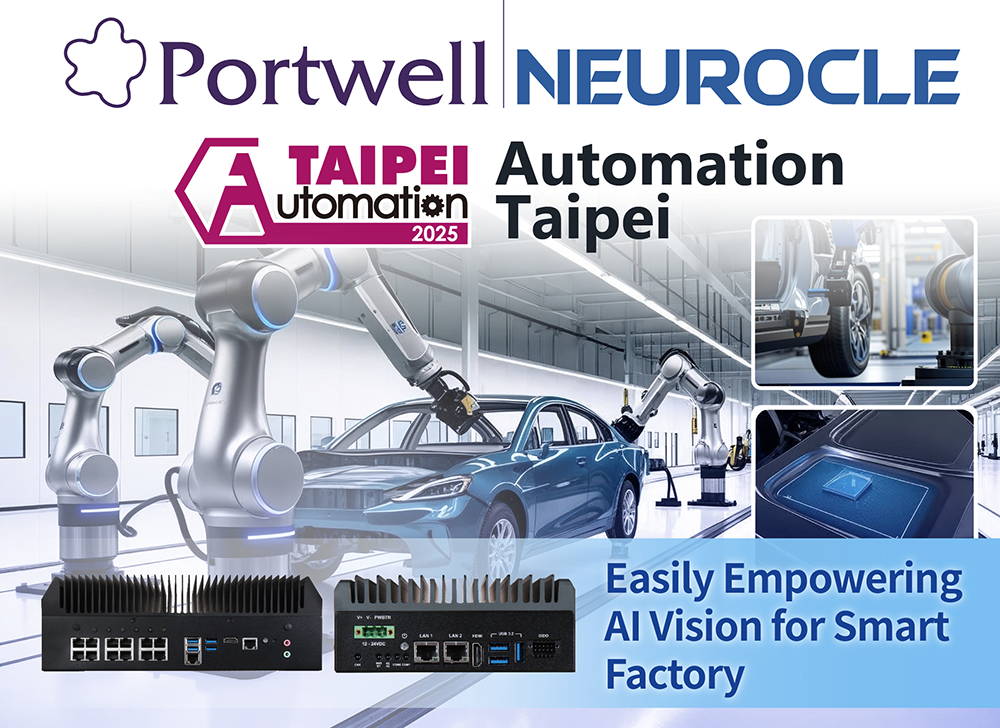
As global manufacturers strive to embrace Industry 4.0 to enhance productivity and agility, automated visual inspection has become a critical element in modern production lines. Traditional rule-based vision systems often fall short in handling complex defect patterns or dynamic environments. In contrast, deep learning-based solutions, while powerful, are typically difficult to develop and deploy, requiring AI coding expertise and costly computing infrastructure. The market now demands a smarter, faster, and more accessible way to implement AI-powered quality control directly at the edge—delivering real-time results without sacrificing accuracy or scalability. This innovative approach ensures that manufacturers can maintain high standards of quality while optimizing operational efficiency.
At Automation Taipei 2025, Portwell and Neurocle jointly present a ready-to-deploy, AI-driven vision inspection solution designed to meet the increasing needs of intelligent manufacturing. This collaboration combines Portwell’s industrial-grade NVIDIA® Jetson modules-based edge computing platforms with Neurocle’s Auto Deep Learning vision software to streamline inspection model training, deployment, and inference at the edge. This joint solution enables manufacturers to quickly implement robust AI inspection systems without requiring specialized knowledge in deep learning—reducing time-to-deployment while improving inspection accuracy, speed, and system scalability.
Neurocle brings to the partnership its signature Auto Deep Learning Vision Inspection Software and runtime API—Neuro-T and Neuro-R—designed to simplify and accelerate the creation of high-performance deep learning models and their deployment across a wide range of platforms for vision inspection. Neuro-T, a GUI-based, no-code software for training image-related deep learning models, empowers users, even non-experts, to create powerful AI models without extensive deep learning knowledge, leveraging automated optimization of model architecture and hyperparameters. Once trained, models are deployed using Neuro-R, a runtime library that supports real-time inference on various platforms, from CPUs and GPUs to embedded edge devices. Neurocle’s lightweight, high-precision models are particularly suited for real-time industrial inspection, offering excellent accuracy even in high-resolution or compute-constrained environments.
Portwell’s PJAI edge AI computing system series, including the PJAI-100 and PJAI-200, forms the hardware backbone of this collaborative solution. The PJAI-100—built on the NVIDIA Jetson Orin™ NX module or Jetson Orin Nano™ module—provides up to 100 TOPS of AI performance in a fanless, compact system ideal for edge deployment. For more intensive tasks, the PJAI-200, powered by the NVIDIA Jetson AGX Orin™ module, offers up to 200 TOPS and extensive I/O support, including 12 PoE ports and 10GbE networking, ensuring robust integration with multiple cameras and high-throughput devices. Both platforms deliver industrial-grade thermal reliability and seamless connectivity, making them perfect for mission-critical factory automation applications.
This demo at Automation Taipei highlights two powerful applications from real-world production environments. The first is a model for detecting and classifying studs on automotive wheels, ensuring correct assembly and vehicle safety. The second performs OCR and segmentation on pouch-type battery surfaces, enabling automatic serial number verification in battery production lines. These use cases showcase the strength of Neurocle’s inference models running smoothly on Portwell’s edge systems—achieving fast, accurate, and scalable inspection directly at the edge. The solution is also highly adaptable across sectors such as electronics, semiconductors, and precision manufacturing.
Through this partnership, Portwell and Neurocle demonstrate a strong commitment to enabling smarter manufacturing through AI innovation. Their integrated solution bridges the gap between complex AI vision technology and practical deployment in industrial environments. By making deep learning and real-time inference more accessible and scalable, the collaboration supports the broader adoption of Industry 4.0 practices—empowering factories to enhance quality control, reduce costs, and remain competitive in a rapidly evolving market.